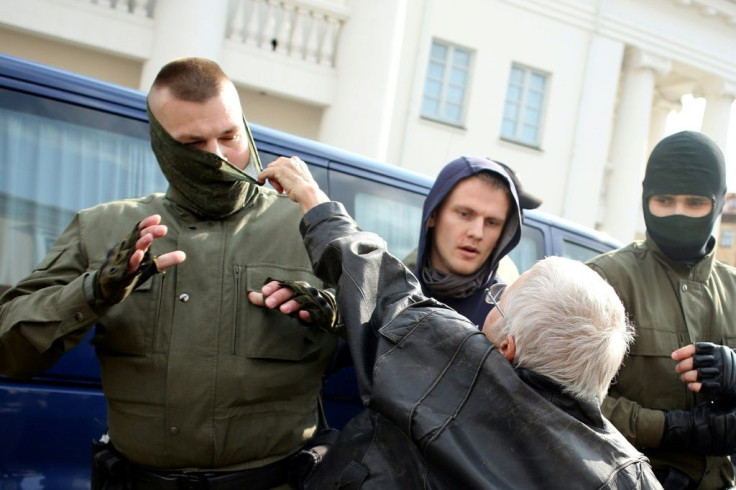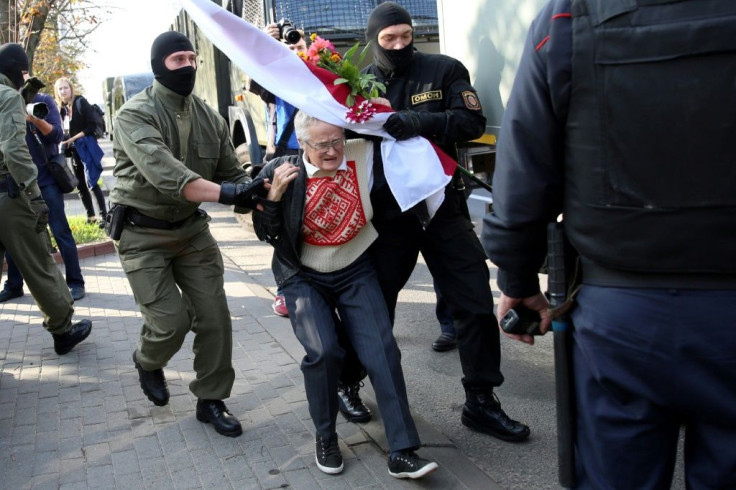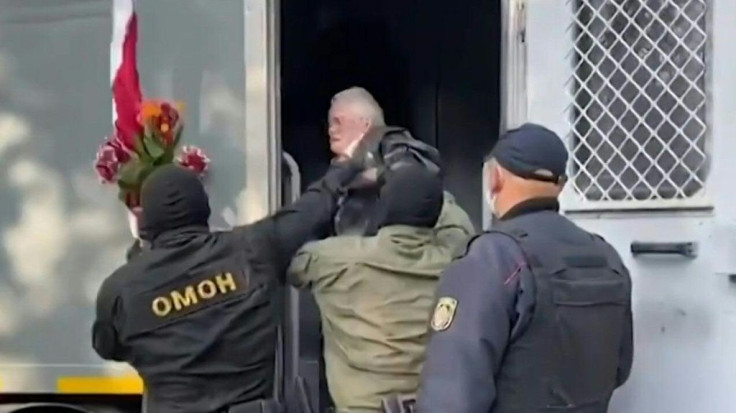Belarus Great-grandmother Protest Star Defies Police
At 73, Nina Baginskaya is one of Belarus's most prominent veteran activists, facing regular detention by police as she marches in support of the opposition.
The small, sprightly great-grandmother is frequently at the frontline of anti-government protests and altercations with masked riot police who tower over her.
On Saturday, police detained her as she took part in a "Shiny March" where women protested in sparkling accessories, demanding an end to President Alexander Lukashenko's 26-year rule.
They took away the flag and bunch of flowers she was carrying and pushed her into a van as the petite activist with cropped grey hair and glasses shouted angrily.
She was released shortly afterwards.

Since huge protests broke out in Belarus over Lukashenko's disputed re-election last month, Baginskaya has resisted arrest, sparred with riot police and stood in front of a police van to block its path.
Parading through the streets of the capital Minsk carrying the opposition's white-and-red flag, Baginskaya has become one of the protest movement's most famous symbols.
"I couldn't not go," she told Nasha Niva newspaper shortly before her detention on Saturday. "How could I just sit there? How could I sleep easily?"
In August, a video of the activist pushing past two masked riot policemen with a flag in her hand went viral on social media.

"I am going for a walk," she defiantly told two policemen towering over her.
At a protest this month, she tore off the black balaclava of a security agent to reveal his face, as he was wearing a uniform without a name badge or identifying insignia.
A mother-of-two, Baginskaya lives with her son, granddaughter and great-grandson.
She sews her protest flags herself, and has become a Belarusian celebrity, with strangers often thanking her and protesters greeting her with chants of "Nina! Nina!"

Tens of thousands of Belarusians have flooded the streets of Minsk and other cities after Lukashenko, who has ruled the ex-Soviet state for 26 years, claimed re-election with 80 percent on August 9.
His opposition rival Svetlana Tikhanovskaya also claimed the victory.
Lukashenko has refused to step down and turned to Russian President Vladimir Putin for support.
His security forces have detained thousands of protesters, many of whom have accused police of beatings and torture.
Several people have died in the crackdown.
Baginskaya studied geology at the National Oil and Gas University in the western Ukrainian city of Ivano-Frankivsk.
She became politically active in the twilight years of the Soviet Union, attending her first protest rally in Belarus in 1988 against Soviet rule.
A self-described nationalist promoting the use of the Belarusian language, she was fired from her job at a state research centre after Lukashenko came to power in 1994.
The Belarusian opposition has traditionally called for greater use of the national language in order to create a stronger sense of identity. Russian, though, is more widely spoken and used by state media.
Baginskaya has paid a heavy price since for her activism.
She has been arrested many times and spent nights in jail, and half of her tiny monthly pension goes towards paying off thousands of dollars worth of fines she has received over the years.
In 2016, court bailiffs seized her microwave and washing machine and later put her two dachas, or country cottages, on sale.
"I can't say I get a kick out of diving in head-first," Baginskaya said in a 2018 interview with Belsat, a Warsaw-based opposition television channel.
"It's my duty. I'm not an animal who just eats and doesn't think about future generations."
The elderly woman encourages the young to keep protesting and says she herself will demonstrate for as long as she can.
© Copyright AFP 2024. All rights reserved.











